Attorney General Holder told the House Judiciary Committee Thursday that Justice is only targeting dispensaries not in compliance with state laws. Medical marijuana advocates called him a liar.
A trial over a big cocaine bust in Michigan ended up taking out a judge, a prosecutor, and a pair of cops as they constructed a conspiracy of lies to help win their case.
David Bronner, president of Dr. Bronner's Magic Soaps, which imports more than 20 tons of hemp oil each year from Canadian farmers, was arrested by members of the DC Metropolitan Police Department after committing an act of civil disobedience within sight of the White House early Monday morning.
Drug War Chronicle interviewed David Bronner, president of Dr. Bronner's Magic Soaps, on Sunday prior to his Monday morning hemp civil disobedience at the White House.
A new Rasmussen poll shows the Colorado initiative to legalize and regulate marijuana like alcohol is well-positioned to win in November.
DrugWarFacts.org, a publication of Common Sense for Drug Policy, is an in-depth compilation of key facts, stats and quotes on the full range of drug policy issues, excerpted from expert publications on the subjects. The Chronicle is running a series of info items from DrugWarFacts.org over the next several weeks, and we encourage you to check it out.
For the second time in a year, Cedars-Sinai Hospital in Los Angeles has denied a life-saving organ transplant to a patient solely because of his or her medical marijuana use.
After a brief hiatus, the DEA wrecking ball was back at work in California this week. Also, an important court victory in Colorado, a couple of court losses in Oregon, and Vermont is accepting dispensary applications. And there's a whole bunch more, too.
A federal appeals court has thrown out a Job Corps worker drug testing program, saying the government had not provided any reason to grant an exception to the Fourth Amendment's ban on warrantless searches and seizures.
In an effort to reduce the spread of HIV, Hepatitis C, and other blood-borne disease, authorities in Kenya will start distributing needles to injection drug users next month.
France's Socialists don't want to legalize marijuana, but their likely coalition junior partners, the Greens, do. It's a start.
There may be justice yet for Ramarley Graham, the Bronx teenager killed by police in his own bathroom as he tried to flush a baggie of weed. The cops said they thought he had a gun. He didn't, and now one narc has been indicted for manslaughter.
Bad deputy! We have three cases of misbehaving sheriff's deputies this week, plus the mandatory crooked prison guard.
US Attorney General Eric Holder appeared before the House Judiciary Committee last Thursday and defended his Justice Department's crackdown on medical marijuana cultivation and distribution. Holder told committee members the agency was only targeting only those medical marijuana businesses that were "acting out of conformity… with state law."
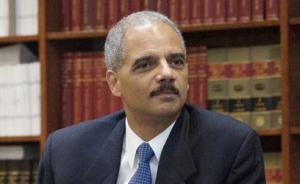
Eric Holder
That had medical marijuana defenders up in arms at what they called his falsehoods. Advocates pointed to numerous dispensaries and other medical marijuana-related enterprises that were operating in compliance with state laws and with the support of local elected officials that have been raided by the DEA or subjected to other federal enforcement actions.
Holder's comments came in response to questioning from Rep.
Jerrold Nadler (D-NY), who pointed out that during his 2008 presidential campaign, Barack Obama had promised that he wouldn't use "Justice Department resources to try to circumvent state laws on this issue."
Holder agreed that the Justice Department had broken with Bush administration policy and promised not to go after people operating in compliance with state laws. But large-scale growers and dispensaries have "come up with ways in which they are taking advantage of these state laws and going beyond that which the states have authorized," Holder added. "Those are the only cases we've being going after."
Nadler pointed out that since 2009, the DEA and federal prosecutors have raided almost 200 dispensaries and growers and indicted more than 60 medical marijuana providers on federal drug charges and again asked Holder to clarify.
Holder responded that the Justice Department is only going after "those individuals (and) organizations that are acting out of conformity... with state laws."
Holder added, however, that in some cases, mainly in Colorado, the department was also targeting dispensaries located "too close" to schools. Those enforcement actions were taken not because the dispensaries were violating state laws, but because they were inside the 1,000-foot range specified by an enhanced federal sentencing statute.
Holder "lied to the House Judiciary Committee" in saying the Justice Department was only going after dispensaries and growers that were not in compliance with state laws,"
California NORML (
CANORML) retorted bluntly. "The Justice Department's bad faith seriously impugns the credibility and competence of Attorney General Holder and his administration."
Steph Sherer, executive director of
Americans for Safe Access (
ASA), was only slightly more politic.
"What he said to our congressional representatives should be alarming not only to medical cannabis patients, but also to policymakers and the general public, because, based on all of the available information we have, it surely must be a lie," she wrote on the
Huffington Post.
The
Marijuana Policy Project (
MPP) was a bit more diplomatic.
"The problem with Holder's statements is that the federal government's determination of compliance with state law is still fairly ambiguous, even arbitrary,"
MPP spokesman Morgan Fox told the Chronicle. "This makes it difficult for medical marijuana providers to know if they are safe, creating a chilling effect on the entire industry and resulting in pain, suffering, and potential danger for patients forced to resort to the illicit market."
The states should decide whether a dispensary is violating state law, he added.
"At the end of the day, it should be state authorities who determine if operators are in compliance with state law, not federal prosecutors who view the entire industry through a filter of illegality," Fox said. "Beyond that, using any federal resources to interfere with medical marijuana in states where it is legal is an inexcusable waste when there are far more serious problems that need attention."
CANORML was quick to point to a long list of California medical marijuana facilities that had been raided, threatened, or driven out of business by federal enforcers despite having sterling reputations, local official support, and complying with state laws and local regulations. Among them are many well-known and -respected operations including the Berkeley Patients Group, the Marin Alliance for Medical Marijuana, Richard Lee's
Oaksterdam University and Blue Sky Coffee Shop, Mendocino County's
Northstone Organics, and at least five San Francisco dispensaries, including the Vapor Room, Hope Net, Divinity Tree,
Shambhala, and
Medithrive.
CANORML noted that in all of those cases, local officials denounced the Justice Department enforcement actions, "but US Attorneys have insolently disregarded community sentiment."
And that's just in Northern California. US Attorneys in other parts of the state have been equally -- if not more -- active in going after medical marijuana providers. Just one day before Holder addressed the committee, federal prosecutors in Southern California announced
a crackdown on Los Angeles County dispensaries, with the DEA raiding two dispensaries and federal prosecutors sending threat letters to 34 more.
The statewide crackdown has been ongoing since last October, when the state's four US Attorneys jointly announced their campaign to rein in the industry. According to
ASA, the federal actions have forced more than 300 medical marijuana operations to shut down.
"It's simply not believable that all of these taxpaying businesses were operating in violation of state law,"
Sherer noted, before asking a series of pointed questions. "If they were, why didn't the state take part in the raids? Why didn't the state or local authorities issue arrest warrants? Why would state and local politicians stand up for businesses breaking state and local laws?"
And stand up they have. Local elected officials, state representatives, state officials, even California Attorney General
Kamala Harris have all urged the feds to butt out.
Harris wrote to all four US Attorneys in December, telling them the federal government was "ill-equipped" to interpret and enforce state medical marijuana laws.
The fight continues. On Wednesday, the same day the feds announced a new phase of their offensive in Southern California and the same day President Obama visited the Bay Area on a fundraising trip, three San Francisco supervisors wrote an
op-ed asking him to "keep the commitment he made to stop the federal government's attacks on medical cannabis."
For medical marijuana advocates, listening to Attorney General Holder saying he is only targeting operations in violation of state laws is bringing back memories of that old country and western music song: "Who are You
Gonna Believe? Me or Your Lying Eyes?"
back to top
special to Drug War Chronicle by Clarence Walker, [email protected]
[Editor's Note: Unless otherwise noted, the information in this article comes from official court documents in the cases under discussion below. Those documents are available online here.]

disgraced former Wayne County Assistant DA Karen Plants (lawreport.org)
Assistant District Attorney Karen Plants was head of the drug unit at the Wayne County District Attorney's Office in Detroit, Michigan, when the suburban
Inkster Police Department scored a major drug bust in 2005. Acting on a "reliable tip," officers reeled in 47 kilos of cocaine, the largest haul the
Inkster authorities ever made.
Swiftly taken down were Alexander
Aceval, Ricardo "Richard" Pena, Chad
Povish and Brian Hill, and police estimated the value of the cocaine in the millions. The bust was highly celebrated by police and prosecutors, evidence that the war on drugs was working.
Yet what came next blew the lid off one of the worst cases of police, prosecutorial, and judicial misconduct in Michigan history. The arresting officer, the prosecutor, and the trial judge ended up being charged with a string of crimes ranging from obstruction of justice to perjury.
As Circuit Judge Mary
Waterstone, who presided over the trials of
Aceval and Pena, told a Michigan Attorney General's Office investigator, prosecutor Plants expressed concern that the life of the informant who made the "reliable tip" was in danger. That informant was Chad
Povish, who set up his co-defendants to be arrested.
Waterstone said Plants told her she discussed the looming perjured testimony with Tim
Baughman, head of the DA's Office appellate division, who told Plants to inform
Waterstone, but not the defense.
Baughman also suggested the record of the private conference be sealed.
Waterstone and Plants then agreed to knowingly allow perjured testimony by
Povish and the arresting officers -- that police didn't know
Povish -- into the trial in a bid to protect his identity. Plants later confessed that she had acted improperly.
"I informed the court when the witnesses lied and I did so in a manner to protect the identity of the confidential informant," she said. "In retrospect, I would have handled the case differently. I realize that allowing
false statements is wrong."
In their private meetings,
Waterstone and Plants agreed with arresting officers Sergeant Scott
Rechtzigel and Detective Robert McArthur and
Povish to hide from defense attorneys evidence that would reveal
Povish was the snitch who set the bust up.
Povish later told investigators that Plants coached him to testify falsely that he wasn't an informant but only an innocent party to the offense.
Povish said the message from then-prosecutor plants was clear: "I didn't know either of the officers." But this wasn't true.
Povish was a paid informant for the
Inkster police. He also personally knew the officers whom he helped to make the biggest drug bust of their careers.
Police contradicted
Povish's story when they finally confessed that he tipped them off about the cocaine in order to collect 10% of
Aceval's assets, the standard finder's fee in
Inkster.
Povish had done the same with other drug dealers in the past. He would later be granted immunity for his perjury in the
Aceval and Pena case in return for testifying truthfully against the police, the prosecutor, and the judge.
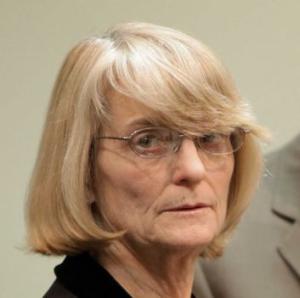
disgraced former Wayne County Judge Mary Waterstone (3rdcc.org)
Both Plants and
Waterstone said they felt the informant's life was in danger if he were exposed as the person who helped police take 47 kilos from the Mexican drug cartels. But there was never any testimony from a witness or police to substantiate those fears. The judge's and prosecutor's fears may or may not have been justified, but their actions trampled on the constitutional rights of the defendants. And it doesn't end there.
Michigan attorney David L.
Moffitt represented
Aceval on appeal after he and Pena were convicted on perjured testimony. He insists that police were playing fast and loose with the truth from the time the bust went down. The arresting officers wrote in their reports that they saw
Aceval and Pena place kilos of cocaine into
Povish's Oldsmobile, he points out. But
Povish himself testified that he and Brian Hill loaded the coke.
"Immediately upon the arrests of Alexander
Aceval and Ricardo Pena, the perjury scheme went into motion,"
Moffitt declared at the time.
Allowing perjured testimony is absolutely inexcusable, said Wayne State law professor Peter Henning.
"There's no circumstance in which perjury should knowingly be allowed to be put before a jury. And if it is discovered afterward, it needs to be corrected and that's true even in a case such as this one," he told the Metro Times.
Although this was clearly a case of multi-level misconduct, it worked -- at least at first.
Aceval and Pena were convicted based in part on perjured testimony and sentenced to prison.
Povish and his friend Brian Hill were never charged. Justice had been served, or so it seemed.
The Tables Turn
But things took a dramatic turn when
Moffitt and James
Feinburg,
Aceval's and Pena's appellate attorneys, discovered the secret meetings between prosecutor Karen Plants and Judge Mary
Waterstone. The Wayne County legal structure shuddered as if hit by an earthquake. When news broke that the prosecutor enlisted the judge in the case to go along with perjury by police and Chad
Povish during
Aceval's and Pena's trials, lawyers and concerned citizens were stunned.
Judge
Waterstone was charged with misconduct in office, a felony which carried five years in prison. Plants and the officers were charged with obstruction of justice and perjury, offenses punishable by life in prison. If convicted, Plants would fall from her prestigious position as head anti-drug prosecutor for the DA's Office to being a criminal ringleader in what had been the biggest case of her drug-fighting career.
"Prosecutor Karen Plants intentionally conspired with Judge Mary
Waterstone and the officers to hide the truth about Chad
Povish being the informant,"
Moffitt recently told this journalist during an interview.
"Plants and Judge
Waterstone were in on the fabrication from the beginning, yet Plants told the court she had not spoken to
Povish before
Aceval and Pena's preliminary examination. "Without
Povish's pejury at the preliminary hearing Mr.
Aceval could not have been bound over for trial,"
Moffitt said.
Perjury in the
Aceval-Pena case is another classic example of prosecutors and law enforcement officers engaging in shady tactics to win at all costs. When DA Karen Plants allowed lies to infect the case against
Aceval and Pena, her actions amounted not only to prosecutorial misconduct, but rose to the level of criminal behavior.
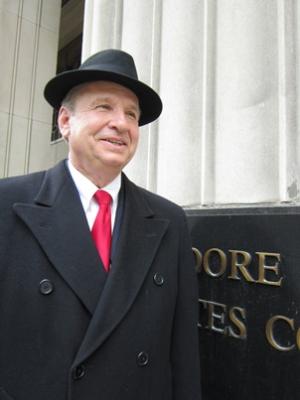
Attorney David Moffitt
Plants' behavior was extreme, but prosecutors cutting corners to win convictions has been a problem all over the country. Reports of rampant prosecutorial misconduct have led Senator Lisa
Murkowski (R-AK) to introduce
Senate Bill 2197, the Fairness in Disclosure of Evidence Act, which had
a hearing in the Senate Judiciary Committee last week. The bill is a bipartisan proposal with five cosponsors that requires federal and state prosecutors to turn over to defendants all evidence favorable to their case. The bill would also impose penalties when prosecutors fail to do so.
Anatomy of a Bust
Alexander
Aceval owned a popular club in Farmington Hills outside Detroit called "J-Dub."
Aceval's club generated lots of business and he made lots of money. Chad
Povish was a professional carpet installer who friends said once wanted to become a cop -- and sometimes acted like one. But instead he became a paid snitch for the
Inkster Police Department under narcotic detective Robert McArthur.
Povish met
Aceval through a friend named Bryan Hill. Hill worked at
Aceval's club as a bartender. During conversations between
Povish and Hill, Hill confided to
Povish that
Aceval sold more than liquor. This startling news piqued
Povish's interest.
On March 11, 2005, according to court records, club owner
Aceval offered
Povish a cool $10,000 to drive a load of cocaine (worth millions) to a designated location when the drugs arrived from a Mexican drug cartel connection in Texas.
Povish was excited. He thought he'd hit the jackpot!
First, he contacted Detective Robert McArthur and laid out the plans about to go down. McArthur called Sergeant Scott
Rechtziel to assist. A trap was set for the suspected dealers, and the officers were anxious to make the biggest drug bust of their careers.
Once
Aceval's Texas connection delivered 47 cocaine kilos,
Povish and and Hill stashed the contraband into duffel bags and placed them into Hill's 1986
Oldsmobile vehicle located outside
Aceval's club.
Aceval allegedly directed
Povish and Hill to transport the drugs to a certain location.
Aceval followed in a separate vehicle. Pena was arrested near the club with cocaine in his pocket.
But the deal was doomed. As soon as the vehicles hit the highway, the police swooped in and stopped
Povish and
Aceval's vehicle. Everyone was arrested. But
Povish and Hill were released.
Aceval and Pena were charged with possession with intent to distribute over 1,000 grams of cocaine including conspiracy to deliver over 1,000 grams of cocaine.
Courtroom Drama: Here Comes the Judge
Police and prosecutors wanted to hide the fact that
Povish was the snitch, and that he was motivated to target
Aceval because of the chance for a big payday -- he would receive a percentage of
Aceval's not insubstantial assets. While Judge
Waterstone and Prosecutor Plants would later say they hid the information about
Povish's
informant status from the defense to protect him from being killed, it also removed potentially damaging lines of inquiry for the defense team.
"It was always known that there was an informant," said appellate attorney
Moffitt.
Aceval's trial attorney, James Feinberg, had also suspected
Povish or Hill as the informant and that perjury existed. Before trial, attorney Feinberg asked the court to identify the confidential informant. During an evidentiary hearing on June 17, 2005, Judge
Waterstone conducted an interview with Detective McArthur. McArthur informed the judge that he and Sergeant
Rechtizigel knew that
Povish was the confidential informant, adding that
Povish had been paid $100 for his services and, "He was going to get 10% of whatever we get."
The conference meeting record was sealed. Judge
Waterstone denied Feinberg's motion to identify the informant although the officers had already told her that Chad
Povish was the informant.
It kept getting worse. As a court reporter took down notes during a meeting between DA Plants and Judge
Waterstone, Plants sounded worried as she explained how defense attorneys for
Aceval and Pena were trying to obtain phone company records for
Povish and Hill's cell phones. Plants mentioned she heard from a jailhouse informant that
Aceval and Pena had targeted
Povish or Hill as the guys who gave them up.
Waterstone heeded Plants' concerns. Instead of letting the defense attorneys know about the meeting as the law required,
Waterstone issued an order to the phone carriers informing them not to release the cell records.
Subsequently, attorney Feinberg fired off another motion to have Waterstone to suppress other specific evidence. At a hearing on September 6th 2005, Sgt. Rechitzel lied when he testified, in response to defense counsel's questioning, that he "never had any contact with Povish before the arrest of Aceval and Pena on March 11th 2005."
Even though prosecutor Plants knew the officer was lying, she never objected. But there was more.
On September 8, 2005, in another private conference without defense attorneys present, the prosecutor admitted to Waterstone she knew Sgt. Rechitzel lied about denying involvement with Povish and Hill prior to the time he arrested Aceval and Pena.
"I let the perjury happen because I thought an objection would reveal the identity of the informant," Plants said.
Judge Waterstone agreed with Plants. "Given the circumstances, it was appropriate for the officer to lie," she said in the sealed record of the meeting.
In his appeal, attorney Moffitt asserted that a transcript showed that Plants asked pointed questions of Povish and both officers, questions which elicited false responses, which Plants knew were false but never corrected.
During trial on September 12, 2005, Chad Povish took the stand and repeated the lie that he never met officers Rechtizgel or McArthur before they stopped his cocaine-loaded vehicle and lied again when he testified that neither officer offered him a deal of any kind. He also testified he never knew what the duffel bags contained.
In closing arguments to jurors, Plants characterized Chad Povish and Bryan Hill as "dummies stupid enough to be mules."
"The prosecutor's argument misled jurors about Povish's true role in actually helping police to arrest Aceval and Pena," Moffit noted.
Aceval's trial ended in a hung jury while Pena was convicted on drug charges. Meanwhile the attorneys for both men filed appeals on their behalf. Pena's conviction was overturned. Pena's reversal exposed what the attorneys already knew: a conspiracy to cover up perjury had been going on.
Prior to Aceval's new trial, Moffitt and his co-counsel encountered another shocker: Despite Judge Waterstone's and DA Plants' admissions that they allowed perjured testimony by the cops and the informant in the first trials, the new judge would allow DA Paul Bernier to call Waterstone, Plants, informant Chad Povish, and the cops as witnesses in the retrial of Aceval to explain why false testimony wound up in the original case.
"That was incredible," Moffitt said.
Harmless Error
Once the court records detailing the secret meetings between Plants and Waterstone discussing the perjured testimony of Povish and the police officers were unsealed, attorney Moffitt filed a motion to quash the indictment against Aceval to block a retrial. A new judge, Vera Jones, appointed to the case after Waterstone recused herself, denied Moffitt's motion to dismiss.
Moffitt appealed, but the appellate court upheld Jones's ruling without much explanation. The appeals court also refused to find that Plants had committed prosecutorial misconduct. Moffitt appealed to the Michigan Supreme Court. In December, 2010, the Supreme Court rejected the appeal.
"The high court's failure to summon a majority to review whether judicial and prosecutorial misconduct can be a basis to convict may relegate Michigan's justice system to one worthy of a third world dictatorship," Moffitt told the Detroit News.
The Quest for Justice
David Moffitt is not a quitter when it comes to fighting for the underdogs caught up in the criminal justice system. He has been a passionate advocate to see that the public officials in the prosecution of Alexander Aceval and Richard Pena are punished not only in state courts but also to face charges for civil rights violations in federal court.
"This case should be looked at closely by the feds," Moffitt said.
Moffitt continues to wonder how much the upper echelons of the Wayne County District Attorney's Office knew about Plants' subornation of perjury in the Aceval and Pena trial. He recalls Wayne County Chief Prosecutor Kym Worthy remarks about her duty to prosecute former Detroit Mayor Kwame Kilpatrick for perjury.
"Witnesses must give truthful testimony and we demand that they do," she said then.
"Ms. Worthy does not hold herself or her employees to the same standards," Moffitt said."There's absolute proof that Worthy's Assistant DA Karen Plants confessed to allowing lies in my client's case and Worthy didn't have the moral turpitude to fire Plants for actually committing a crime in a court of law. She allowed her to retire."
With defense efforts to get the case thrown out because of prosecutorial and judicial misconduct thwarted, Aceval and Pena took plea deals instead of going back to trial in 2006.
The Judge Walks
After a series of appeals and pretrial challenges, on April 11, the Michigan Appellate Court dismissed the last pending felony charge against the now retired Judge Waterstone. Last year, Wayne County presiding Judge Timothy Kenny dismissed three other counts against Waterstone, who retired after the Aceval-Pena scandal.
As Kenny put it in his decision, "the meetings between Waterstone and Plants were not a neglect of duty as alleged in the indictment, but instead their actions were deliberate acts taken out of concern for informant Povish's safety."
Michigan Attorney General John Selleck hinted he might appeal the final dismissal of charges against Waterstone. "We are reviewing the opinion and will make a decision on which action to take at a later time,"
Waterstone was elated. "I'm going to get a good night's sleep for the first time in three years," she told the Detroit Free Press.
Former DA Plants wasn't so lucky. She pleaded guilty to official misconduct and was ordered to serve six months in jail. Earlier this year Plants' law license was permanently revoked.
Officer Robert McArthur pleaded guilty to a misdemeanor charge of filing a false report and he, too, was ordered to serve 90 days in jail. Sergeant Rechtizgel pleaded guilty to a similar charge but no jail time was ordered.
A judge forced to retire in disgrace and who barely escaped felony charges. An ambitious prosecutor forced to retire in disgrace, disbarred, and jailed. Two police officers forced out of their jobs and convicted of criminal charges. If those police officers and judicial officials had simply honored their oaths to uphold the law, such fates would not have befallen them.
But that would have made it more difficult to win their case. And that desire to win at all costs trumped upholding the Constitution.
back to top

protest cage with "Mr. President, Let U.S. Farmers Grow Hemp" sign
David
Bronner, president of Dr.
Bronner's Magic Soaps, which imports more than 20 tons of hemp oil each year from Canadian farmers, was arrested by members of the DC Metropolitan Police Department after committing an act of civil disobedience within sight of the White House early Monday morning.
Bronner and fellow hemp activists pulled up to
16th and H Streets NW, unloaded a jail cell-like structure (to prevent police from immediately interfering), which
Bronner locked himself into with 12 hemp plants. He then proceeded to harvest the plants and press hemp oil from them. (
Bronner was planning to spread the oil on slices of bread and share it with onlookers, but that was unconfirmed at press time.)
[Ed: Read our accompanying interview with David Bronner here, and watch video footage here.]
Bronner said he was waging a "beer bet" with President Obama that the hemp plants are not marijuana and have no drug value. The plants were grown from Canadian hemp seed, and under Canadian regulations, hemp can have no more than 0.3% THC, meaning the plants have no use as a medicinal or recreational drug.
"The industrial hemp plants I am harvesting and processing into oil cannot produce a high of any kind, but according to the Obama administration I'm in possession of approximately 10 pounds of marijuana," said
Bronner. "President Obama's US Attorney who handles drug cases in Washington, DC will not be able to prove my hemp has any more drug value than a poppy seed bagel. The Obama position on hemp is not science-based or good for the US economy. We've lobbied and campaigned for over a decade and feel abandoned by our president, who as an Illinois state legislator voted twice for hemp cultivation."
Activists at
Vote Hemp, with which
Bronner is affiliated, held meetings with the
Office of National Drug Control Policy in 2010 to seek a change in hemp policy, but that effort went nowhere. They then took advantage of the White House's public online petition program to ask it to revise US drug policies to allow for domestic hemp production -- it took a federal court order several years ago to force the DEA to allow hemp products to be imported -- but after a seven month delay, all they got was a slap in the face.
That slap came in the form of a one-paragraph response from
ONDCP head Gil
Kerlikowske entitled "What We Have to Say About Marijuana and Hemp Production."
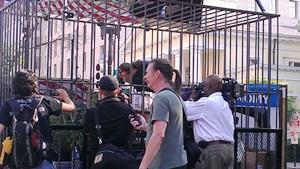
David Bronner at the White House, with media and supporters
"America's farmers deserve our Nation's help and support to ensure rural America's prosperity and vitality,"
Kerlikowske wrote. "Federal law prohibits human consumption, distribution, and possession of Schedule I controlled substances. Hemp and marijuana are part of the same species of cannabis plant. While most of the THC in cannabis plants is concentrated in the marijuana, all parts of the plant, including hemp, can contain THC, a Schedule I controlled substance. The administration will continue looking for innovative ways to support farmers across the country while balancing the need to protect public health and safety."
"I expected more from President Obama,"
Bronner said. "The president can simply direct the Department of Justice to respect industrial hemp grown pursuant to existing state hemp programs, such as North Dakota's. Everyone is sick and tired of America's bankrupt policy on hemp that forces our company to send well over a hundred thousand dollars every year to Canadian farmers. I had hoped that President Obama would not succumb to drug warriors' hysteria regarding hemp. I really don't know what else to do to get our 'Chief Law Enforcement Officer' to take a rational science-based approach to hemp policy in this country."
If the administration won't act, perhaps Congress will. Last week, Sen. Ron
Wyden (D-OR) introduced and Sen. Rand Paul (R-KY) cosponsored an amendment to the Agriculture Department reauthorization bill. That amendment clarifies that hemp is an "agricultural crop" and should not be considered the same as marijuana.
While
Bronner and other hemp activists support that effort, they argue that it's not the law but its deliberate misreading that is at the root of the problem.
"Senator
Wyden's effort is truly commendable, but in my view the existing prohibition of hemp farming stems less from current law than the deliberate misinterpretation of existing law by regressive drug warriors entrenched in the Drug Enforcement Administration, the Office of National Drug Control Policy and other high level members of the Obama Administration,"
Bronner said.
Now, with civil disobedience within eyeshot of the White House, the
hempsters are hoping to up the pressure on the White House to act.
[Disclosure: Dr. Bronner's Magic Soaps is a financial supporter of this newsletter.]back to top
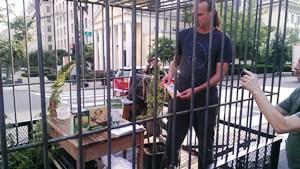
David Bronner grinds hemp plants into oil, H St. outside Lafayette Park at the White House, 6/11/12
Drug War Chronicle: You have been making efforts to get the Obama administration to reassess its hemp policy. How has that been going?
David
Bronner: It's been incredibly frustrating. It's been clear for some time that Obama is being incredibly lame on this. It took them seven months to answer our hemp petition, and when they did, it was with this Orwellian response calling hemp marijuana and opposing legalization. They also refused to meet with a North Dakota delegation, where everyone from the governor on down wants to grow hemp, so what are we going to do?
Chronicle: And now we have the
Wyden-Paul amendment. What do you think of that and what are its chances?
Bronner: The introduction of the
Wyden amendment is good news. Rand Paul came on board, too. The drug warriors will try to strip it out of the farm bill, of course, but maybe the energy out of this civil disobedience action will do the trick. The introduction of the amendment last week certainly sets up this action nicely.
Chronicle: You will be transporting hemp plants to the vicinity of the White House and processing them to produce hemp oil, but the federal government doesn't differentiate hemp from marijuana. You're going to have about 10 pounds of hemp. Aren't you worried about the possible legal consequences?
Bronner: I will be inside a steel cage to prevent police from getting to me while I prepare the hemp oil-
Chronicle: That's a switch.
Bronner: Yeah, although I do expect to eventually be arrested. I'll plead not guilty; this isn't marijuana. I'll fight them all the way, unless all they want to do is give me something like a traffic ticket. Medical marijuana has provided many opportunities for civil disobedience, but hemp is different. You're not going to have a farmer spending months growing a hundred acres for an act of civil disobedience, so I'm doing it.
Chronicle: But it's not just about hemp or what goes on in Washington, DC, for you, is it?
Bronner: We just gave $50,000 to the cannabis legalization campaign in Colorado. Although that initiative does direct the legislature to enact a hemp farming program, this is mainly about legalization. We'll give money to the Washington state effort, too, because once one or two states go, there will be a seismic shift, and the prohibition of hemp will become increasingly lame and untenable.
[Disclosure: Dr. Bronner's Magic Soaps is a financial supporter of this newsletter.]back to top

Amendment 64 billboard (regulatemarijuana.org)
In its June 6 survey of likely voters, Rasmussen found support for marijuana legalization at 61%. More strikingly, only 27% opposed legalization, with 12% undecided. Respondents were asked whether they supported "legalizing marijuana and regulating it in a way similar to the way alcohol and tobacco cigarettes are regulated today."
The conventional wisdom among initiative watchers is that initiatives need to be polling at 60% or above at the beginning of the campaign to have a chance of winning. Veteran observers note that opponents of an initiative are always able to peel away some support with negative campaigning late in the game.
But in Colorado, not only is support for pot legalization strong, it is trending upward. A December 2011 Public Policy Polling survey had support at 49%, with 40% saying it should remain illegal.
Marijuana legalization also had more support than either major party presidential candidate. Both Barack Obama and Mitt Romney garnered 45% support. How the politics of marijuana in Colorado will affect the presidential race there remains to be seen.
Rasmussen conducted phone interviews with 500 likely Colorado voters. The poll's margin of error is +/-4.5%.
back to top
Did you know that in 2009 there were 1.7 million people in US prisons, jails, or on probation or parole for drug offenses? Since 1990, the number of people in those four categories grew by 78.9 percent -- federal prisons by 212.5 percent. Read about it in the Prisons & Drug Offenders section of DrugWarFacts.org.
DrugWarFacts.org, a publication of Common Sense for Drug Policy (CSDP), is an in-depth compilation of key facts, stats and quotes on the full range of drug policy issues, excerpted from expert publications on the subjects. The Chronicle is running a series of info items from DrugWarFacts.org over the next several weeks, and we encourage you to check it out.
Follow Drug War Chronicle for more important facts from DrugWarFacts.org over the next several weeks, or sign up for the DWF new facts RSS feed.
Common Sense for Drug Policy is a nonprofit 501(c)(3) organization dedicated to reforming drug policy and expanding harm reduction. CSDP disseminates factual information and comments on existing laws, policies and practices.

back to top
Cedars-Sinai Hospital in Los Angeles has for the second time in the past year denied a life-saving organ transplant to a patient because of her medical marijuana use, Americans for Safe Access reported this week. The hospital removed qualified medical marijuana patient Toni Trujillo from its kidney transplant list earlier this year, citing her medical marijuana use.
Trujillo has had kidney problems most of her life and has been on dialysis for the past five years, since an earlier transplanted kidney began failing. She came to California from Pennsylvania two years ago to take advantage of specialized treatment offered at Cedars-Sinai. She explained that to her physician at Cedars that she used medical marijuana as an appetite stimulant to increase her protein levels -- a critical need for dialysis patients -- and got no negative feedback.
She continued to use medical marijuana while awaiting her transplant. Then, in April, after being on a waiting list for six years, Trujillo was told over the phone that she had been de-listed because her medical marijuana use was considered "substance abuse." She was never sent a formal de-listing letter, confirming her status.
"Denying necessary transplants to medical marijuana patients is the worst kind of discrimination," said
ASA Chief Counsel Joe
Elford, who authored a
letter to Cedars-Sinai urging the hospital to reconsider. "Cedars-Sinai would not be breaking any laws, federal or otherwise, by granting Toni Trujillo a kidney transplant, and it's certainly the ethical thing to do."
Trujillo's plight echoes that of Norman Smith, a medical marijuana patient who was diagnosed with inoperable liver cancer in 2009. Smith's oncologist at Cedars-Sinai, Dr. Steven Miles, approved of his medical marijuana use as a means to deal with the effects of chemotherapy, but Smith was removed from the liver transplant list in 2011 because of medical marijuana, just two months before he would have been eligible. Last week, Smith was told he had 90 days to live.
ASA also sent a
letter on Smith's behalf.
Cedars-Sinai told both Trujillo and Smith they must not only test negative for marijuana for six months to re-qualify for the wait list, but also take drug abuse counseling for the same period. Both are complying with the requirements and have chosen to forgo using medical marijuana, though it has a significant therapeutic benefit for them. Smith could especially benefit as he is currently undergoing chemotherapy for his cancer, and his appetite is severely diminished. It appears Trujillo and Smith may eventually be put back on the list, but at the bottom. Trujillo recently contracted peritonitis, a bacterial infection, as a result of her dialysis.
"I don't know why Cedars would deny me a transplant simply because I use a legal medication that works for me," said Trujillo. "I hope they listen to reason and change their misguided policy, if not for me then at least for the others who will certainly follow."
back to top
After a brief hiatus, the DEA wrecking ball was back at work in California this week. Also, an important court victory in Colorado, a couple of court losses in Oregon, and Vermont is accepting dispensary applications. And there's a whole bunch more, too. Let's get to it:
California
Last Wednesday,
Kern County dispensaries said they would try to overturn Measure G, a ballot measure approved by 69% of voters a day earlier. Measure G will require dispensaries to move to unincorporated areas of the county and also specifies that they must be a mile away from schools, churches, public parks,
daycares, and each other. Dispensary operators said they are weighing their options for a legal challenge.
Last Thursday,
the Humboldt County Planning Commission voted to revoke the permit for a
Myrtletown dispensary. City planning staff said the Humboldt County Collective had failed to meet certain requirements outlined in its conditional use permit, including failing to widen a driveway and to provide financial information proving the collective is a nonprofit. The April arrest of collective president Bill Byron, 42, in Pennsylvania on suspicion of marijuana trafficking also didn't help. Byron has since stepped down as president. Now, the matter moves to the county Board of Supervisors.
Last Friday,
an LA City Council panel gave its approval to the "gentle ban" that would shut down dispensaries all across the city but allow patients and collectives to have gardens. The council's Public Safety Committee voted 3-1 to recommend the proposal by Councilmen Jose
Huizar and Mitch Englander to shut down dispensaries pending a state Supreme Court decision on the legality of permitting them. The panel also voted against a competing measure from Councilman Paul
Koretz that would have allowed 100 dispensaries to stay open under strict regulation. Next comes a vote of the full council, but a date for that hasn't been set yet.
Also last Friday,
Imperial Beach activists handed in signatures for a Safe Access Ordinance initiative in the city. Activists from San Diego Americans for Safe Access and the
LGBT non-profit Canvass for a Cause handed in 1,555 valid signatures, or roughly 15% of all registered voters in the community. They collected more than 2,600 signatures, then verified their authenticity internally.
On Monday,
DEA agents raided the El Camino Wellness dispensary in Sacramento. The dispensary was among a group targeted by the US Attorney in Sacramento last fall, and the owner of the building in which it was located had been the recipient of a letter from federal prosecutors warning her property could be seized. The DEA raiders were jeered by protestors who mobilized on hearing of the raid.
Also on Monday,
a Lake County board approved a motion recommending guidelines for the number of plants allowable on small parcels. The Lake County Medical Marijuana Cultivation Ordinance Advisory Committee Monday approved a motion recommending allowing no more than three two plants uncovered outdoors for parcels smaller than a quarter of an acre, and up to six uncovered plants for parcels between one-quarter and one-half acre in size. The measure was approved on an 8-1 vote and now goes to the Board of Supervisors.
On Tuesday,
the Lake Elsinore city clerk announced that an initiative campaign was underway to seek the legalization of dispensaries in the city. Backers of the initiative published a public notice last month, so signature gathering should get underway soon. The petition asks residents if they want an election to be held so voters could decide whether to approve an ordinance that would allow a limited number of medical marijuana dispensaries. The proposed ordinance would establish how such medical marijuana operations, also referred to in the petition as cooperatives, would be taxed, regulated and monitored. The city imposed a ban on dispensaries in 2010. An earlier initiative campaign fell short.
Colorado
On Monday,
an El Paso County jury acquitted a medical marijuana grower of drug cultivation charges. Elisa
Kappelmann, 52, had been looking at up to 12 years in prison on state charges after being arrested by Colorado Springs police in connection with a grow she was operating. Police said she was not in compliance with Colorado Department of Public Health documentation requirements. But defense attorney Robert
Corry argued that
Kappelmann had physicians' recommendations and caregiver forms for each of her 22 patients and was within her plant count even under the strictest interpretations of the laws. After six days of deliberations, the jury voted to acquit.
Corry called the trial a "failed political test case" and urged El Paso County prosecutors to rethink their interpretation of the medical marijuana law.
Also on Monday,
the Dacono City Council voted to ban medical marijuana businesses. The 4-2 vote will close three dispensaries, which have a little more than six months to leave town.
Dacono has regulated dispensaries since 2009, although it's had a moratorium barring new ones since 2010. Angry dispensary operators and patients berated the council and vowed to file initiative petitions to get the ban overturned.
Massachusetts
Last Thursday,
the state Supreme Court ruled in favor of medical marijuana opponents who argued the likely November ballot question was misleading. The Massachusetts Prevention Alliance had filed a petition against the question in May, but it was rejected by Attorney General Martha
Coakley's office. Now
Coakley and Secretary of State William Galvin must rewrite the "yes" section of the ballot question and get the new wording approved by the court. Opponents had challenged even the use of the term "medical marijuana," arguing that it isn't recognized as medicine under federal law, but the high court was okay with the term.
New York
On Wednesday,
the New York Assembly passed its medical marijuana bill on a vote of 90-50. That's the third time a medical marijuana bill has passed the Democratically-controlled Assembly, but it has always been blocked from a vote in the Republican-controlled Senate. This year is expected to be no different.
Oregon
Last Wednesday,
a Washington County dispensary operator pleaded guilty to unlawful delivery of marijuana for payment and was sentenced to probation. Local police arrested Terry
Spaunhorst, 54, the operator of Serene Dreams Medical Greens in Hillsboro. Prosecutors said
Spaunhorst sold marijuana, a clear violation of Oregon's medical marijuana law. Last year, authorities raided another Washington County dispensary, Wake 'n Bake Cannabis Lounge in Aloha and convicted its owner on similar charges with similar results. A third dispensary, the Human Collective in
Tigard remains open.
Last Friday,
a Grants Pass man became the first registered Oregon grower to be convicted on federal drug trafficking charges. Jason Nelson, 36, was one of four medical marijuana growers from Southwestern Oregon who pooled their harvests and made monthly shipments from Portland to Boston in pods loaded with furniture bought from Goodwill. The other three faced state charges. Federal prosecutors crowed over the conviction and said they had "one more bit of evidence out there so people can be thinking critically whether or not this is what they want in their communities."
Vermont
Last Thursday,
the Department of Public Safety announced that dispensary applications are now available. The department will authorize up to four medical marijuana dispensaries throughout Vermont based on a competitive scoring process. Applications are now being accepted, and the closing date to apply is June 22, 2012 at 4:30 p.m. A $2,500 non-refundable application fee must accompany all applications. To view the rules for the Vermont Marijuana Program (
VMP) and to obtain a dispensary application, go to the
Vermont Criminal Information Center.
Washington, DC
On Tuesday,
city officials announced that all four dispensaries are free to pursue building and other permits. All four had previously advanced through the city licensing process, and three of the four have already won necessary approval from Advisory Neighborhood Commissions. But it will still be months before patients are able to obtain their medicine in the nation's capital; medical grows approved earlier have not yet planted crops, and the dispensaries will not have any product until the grows harvest.
back to top
A federal appeals court ruled last Friday that a random, suspicionless drug testing program for workers at Job Corps centers is unconstitutional. In a 2-1 decision, the US Circuit Court of Appeals for the District of Columbia held that the US Forest Service, which operates those Job Corps camps, did not demonstrate that drug use among staff or clients was such as problem that it qualified as an exception to the Fourth Amendment's proscription against unreasonable searches and seizures.

drug testing lab
The federal courts have held that drug tests are a search under the Fourth Amendment and have crafted only narrow exceptions to the rule, including testing of truck drivers and airplane pilots, police involved in narcotics work, and school students involved in sports or extracurricular activities.
The Job Corps program operates 28 centers for at-risk youth between the ages of 16 and 24. Clients there receive vocational training at the typically remote locations. The Forest Service had informed the union during negotiations in 2010 that it was going to impose random,
suspicionless drug testing on all employees. The National Federation of Federal Employees, which represents Job Corps workers, filed suit seeking a preliminary junction, but was turned down in federal district court.
But in
National Federation of Federal Employees v. Vilsack, the appeals court sided with the union.
Vilsack is Agriculture Secretary Thomas
Vilsack, who oversees the Forest Service.
"Although identifying governmental interests in the students' abstention from drug use and in their physical safety, the Secretary offered no foundation for concluding there is a serious drug problem among staff that threatens these interests and thus renders the requirement for individualized suspicion impractical," wrote Judge Judith Rogers, who was joined by Judge Douglas
Ginsburg in the majority opinion. "Rather, the Secretary's evidence to date suggests the contrary. Because the Secretary has offered a solution in search of a problem, the designation of all Forest Service Job Corps Center employees for random drug testing does not fit within the 'closely guarded category of constitutionally permissible
suspicionless searches.'"
In his dissent, Judge Brett
Kavanaugh argued that it seemed sensible to drug test employees at residential schools for at-risk youth, some of whom have previously used drugs.
"In these limited circumstances, it is reasonable to test; indeed, it would seem negligent not to test,"
Kavanaugh wrote. "To maintain discipline, the schools must ensure that the employees who work there do not themselves become part of the problem. That is especially true when, as here, the employees are one of the few possible conduits for drugs to enter the schools."
But
Kavanaugh's was the minority opinion, and once again, the federal courts have ruled against random,
suspicionless drug testing absent the government making a strong case for its necessity.
back to top
The Kenyan government will begin distributing needles to the country's estimated 50,000 injection drug users next month in a bid to slow the spread of HIV and other blood-borne diseases. The plan was announced last week in Mombasa, where the first pilot program will begin.
Mombasa, a port city, is reportedly a transit route for international drug trafficking. It also has the country's highest number of injecting heroin users.
"We are trying our best to address the entire problem of drug abuse amongst the youths. We had to identify an alternative of stopping the youths from sharing needles, our attention having been drawn by the rate at which these young people were contracting HIV and other diseases, such as hepatitis," said Dr.
Anisa Omar, the Coast Provincial Director of Public Health and Sanitation. "In Mombasa alone, we have over 26,000 youths who use injection drugs, with at least one out of every four being found to be HIV-positive. In Nairobi, we have 20,000 youths who are
IDUs."
The Kenyan government estimates that injection drug use accounts for 4% of HIV infections and 17% of new HIV infections in Coast Province, where Mombasa is located. The government moved in 2010 to shift from addressing drug use as a criminal issue to addressing it as a public health issue.
The government plans to distribute some eight million needles to injection drug users as the plan is rolled out. It will also encourage people to be tested for HIV and will provide
antiretroviral drugs, condoms, and medicines for tuberculosis, which commonly co-infects with HIV.
While the government has shifted to a public health and harm reduction approach, not everybody is on board. Anti-drug activists and some religious leaders have criticized the move.
"We will file a petition in court… these children of ours don't even have any veins remaining in their bodies," said
Amina Abdalla, secretary of the Coast Community Anti-Drugs Coalition. "Where do they expect them to inject themselves? Their bodies are ruptured and rotten as a result of constant use of the needles. Besides, drug peddlers and barons will have a field day, for they'll know their products will be on demand, and that's not acceptable."
Coast religious leaders also objected, saying the government should instead spend its resources on drug treatment.
But Dr. Omar said that needle sharing significantly reduced the risk of coming down with HIV and hepatitis, and that justified the program.
"The program, which will see every addict given three needles and syringes per day, will be supplied to specified private rehabilitation centers and hospitals by NGOs and qualified medical practitioners, in collaboration with anti-drug campaigners, whom we soon plan to train on how they'll best handle the addicts."
back to top
Just days before the first round of French parliamentary elections, the Socialists and their probable junior partner in a new governing coalition, the Greens, were at odds over marijuana policy. While the spat is unlikely to undo the electoral pact between the two parties, it has pushed pot into the election campaign.

Champs de Elysee, Paris (wikipedia.org)
Newly-elected Socialist President
Francoise Hollande appointed Green Party head
Cecile Duflot Minister of Housing -- one of two Greens in the interim cabinet. This week,
Duflot unleashed the controversy by saying she backed marijuana legalization.
That left
Hollande's team with the task of reiterating the Socialists' opposition to such a move. During a Wednesday night television interview Prime Minister Jean-Marc
Ayrault tried to put the matter to bed. When asked if
Hollande supported legalization,
Ayrault said that
Hollande had opposed it during the campaign.
"The answer is very clear, and it's no," he told
TF1.
If, as expected, the left wins the parliamentary election,
Duflot would have to quit as head of the Greens and leave her legalization position behind in order to stay in the cabinet. She will do that,
Ayrault said.
"Madame
Duflot will do as she promised. From June 23, she will be a minister only, serving solely her mission as a member of the government," he said.
But even if
Duflot backs away from legalization, there is little sign the rest of the Greens will.
Daniel
Cohn-Bendit, known as "Danny the Red" for his role in the 1968 Paris student uprising, a Green Party veteran, said Thursday he hoped the party would press for a legalization bill in the National Assembly.
"It's time to ditch the hypocrisy and double-speak," he told RMC radio. "Today's repression simply plays into the hands of drug traffickers."
Polls this week show the Socialists poised on the verge of winning a parliamentary victory outright, but they will probably need the support of smaller parties on the left, most notably the Greens, but also the Left Front to achieve any sort of parliamentary comfort zone. The Assembly has 577 seats, while polls show the Socialists could take as many as 291, leaving them a razor-thin majority. Support from the Greens and the Left Front could add another 20 or so seats to what would then be a governing coalition led by the Socialists.
back to top

Ramarley Graham
When he was killed in February, Graham was the eighth person to die in drug law enforcement activities so far this year. That number is now up to 28. The indictment of NYPD Officer Richard Haste is the first of any officer in any of those deaths.
Although the indictment has not been officially unsealed, the New York Times reported that a grand jury has indicted Haste, 30, on charges of first- and second-degree manslaughter. More charges could be pending.
Graham was shot and killed after he and a pair of friends caught the attention of narcotics officers who had staked out a bodega on White Plains Road. They radioed their colleagues and said they believed he had a gun in his waistband as he walked toward his home. Officer Haste dashed to the scene, broke into Graham's apartment, and shot and killed him in his bathroom.
No weapon was found, but police did say they found marijuana in a plastic baggie in the toilet bowl, suggesting Graham may have been trying to get rid of the evidence to avoid becoming another New York City pot bust statistic.
The shooting has provoked anger in the community and led to numerous calls for justice for Graham and other victims of overzealous policing in the city. It has also focused attention on the aggressive tactics of the NYPD's Street Narcotics Enforcement Unit, teams of officers who surreptitiously surveil the streets looking for drug deals before bursting in to bust dealers and customers.
The Graham shooting has focused attention on the aggressive tactics of the Police Department’s Street Narcotics Enforcement Units -- teams of six or seven officers who hide on rooftops or in parked cars as they scan the streetscape for drug transactions before swooping in to arrest dealers and customers. Police Commissioner Ray Kelly ordered a review of the units' tactics, but the results of that review have not been released.
The last time NYPD officers were indicted for killing a resident was when three of them riddled Sean Bell's body with bullets as he attended his pre-wedding party in 2007. Those officers were eventually found not guilty.
back to top
Bad deputy! We have three cases of misbehaving sheriff's deputies this week, plus the mandatory crooked prison guard. Let's get to it:
In Newark, Ohio,
a Licking County Sheriff's deputy has resigned, just hours before he was to be interviewed in an internal investigation about allegations he let a woman inject him with stolen narcotics. Although Deputy Nicholas Pearce resigned in May, the news wasn't announced until last Thursday. He resigned 10 days after being placed on administrative leave because a woman he knew told investigators she injected him with narcotics she stole from her employer, Genesis-Bethesda Hospital in Zanesville, according to an internal affairs investigation.
In Michigan City, Indiana,
an Indiana Department of Corrections officer was arrested last Thursday for allegedly smuggling drugs to prison inmates. Tracey Young, 38, is recreational director at the Indiana Department of Corrections Juvenile Facility in South Bend, but had previously worked at the Michigan City State Prison. It is unclear at which prison she is alleged to have done the drug smuggling. She was being held without bond pending arraignment.
In Fort Lauderdale, Florida,
a suspended Broward County's Sheriff's detective was arrested Monday after repeatedly violating the conditions of his bond. Brent
Woodell had been arrested in a September 2011 sting operation for stealing $1,340 in cash from an
Oxycontin dealer he arrested, but had been out on bail. Prosecutors had twice earlier tried to have his bond revoked, once for intimidating a witness and again after he fled the scene of an accident while on his way to a court appearance. This time,
Woodell removed his court-ordered GPS monitor and went to a strip club, where deputies found him. In addition to the grand theft and official misconduct charges,
Woddell is accused of tampering with evidence, falsifying records and delivery of steroids. If convicted of all charges, he faces more than 30 years in prison.
In Memphis,
a former Arkansas sheriff's deputy was sentenced last Thursday to nearly seven years in federal prison for his role in an eastern Arkansas corruption and drug trafficking ring. Winston Dean Jackson is the third law enforcement officer to be sentenced in an investigation the feds dubbed Operation Delta Blues. He pleaded guilty in March to conspiracy to distribute and possession of a controlled substance. One more officer awaits sentencing and one more officer awaits trial in the operation.
back to top















